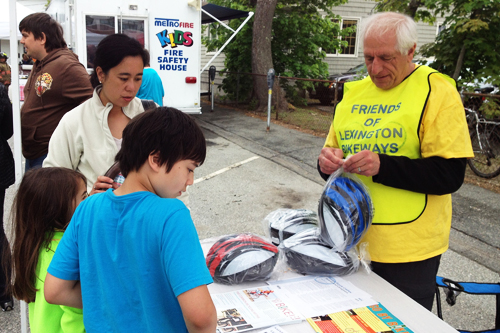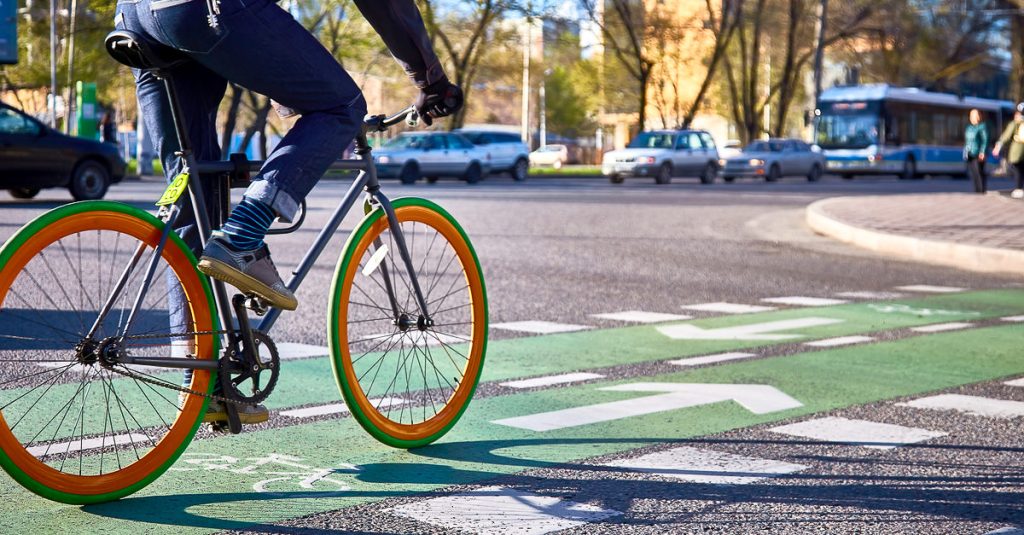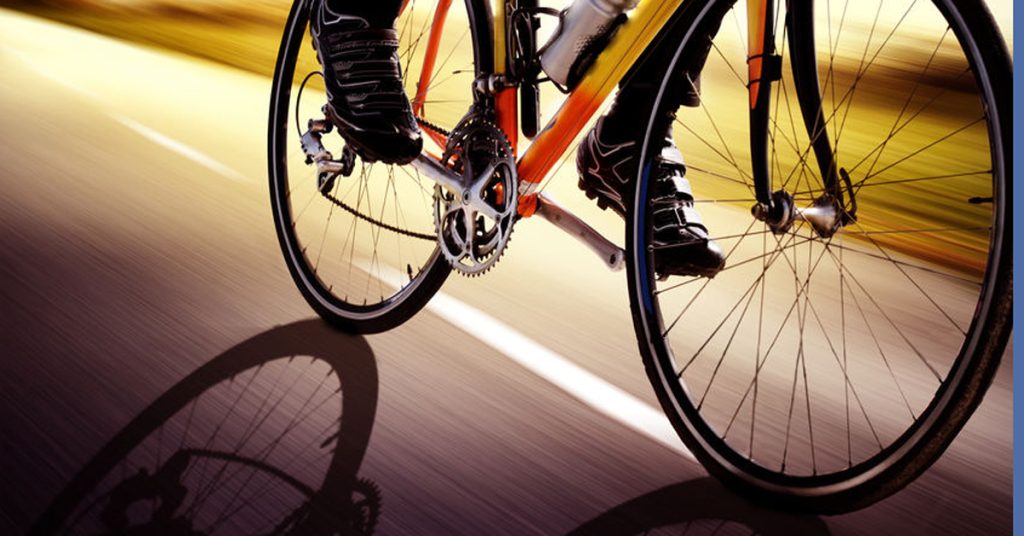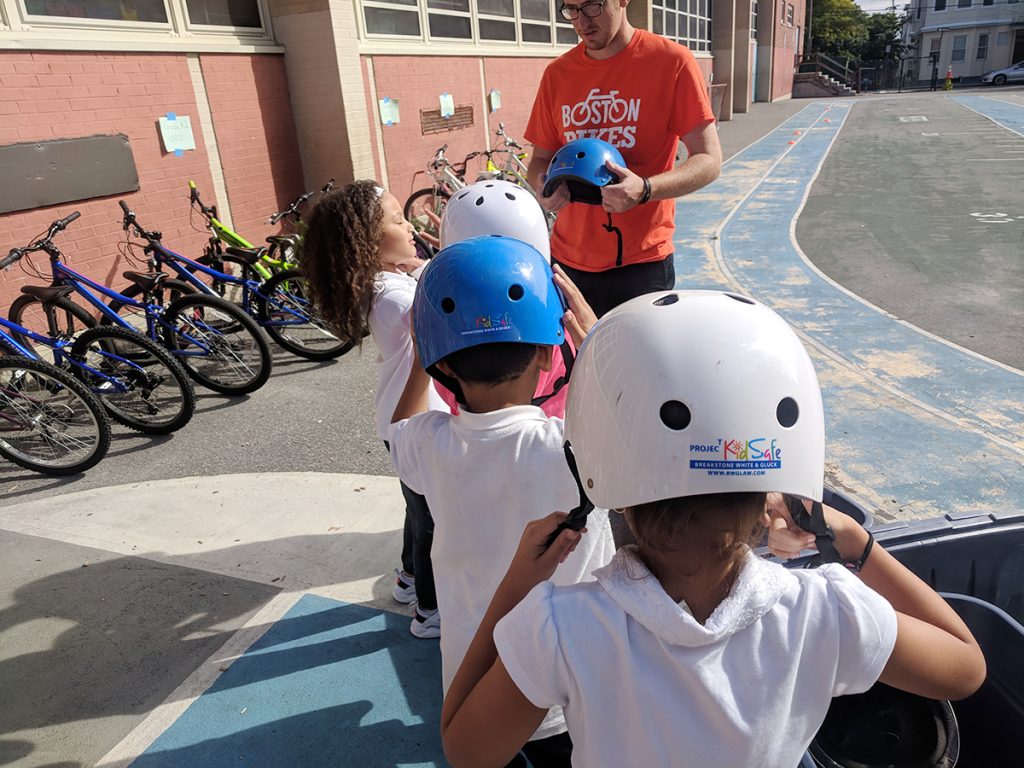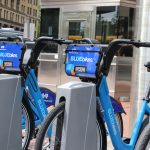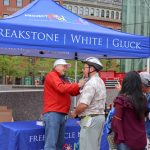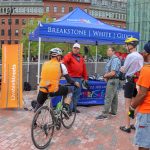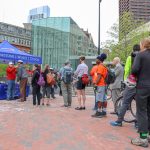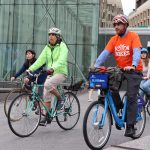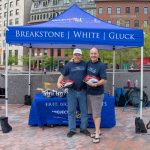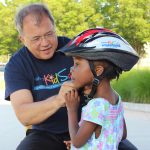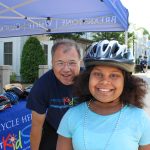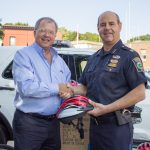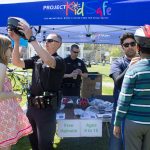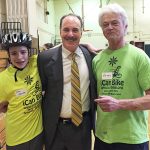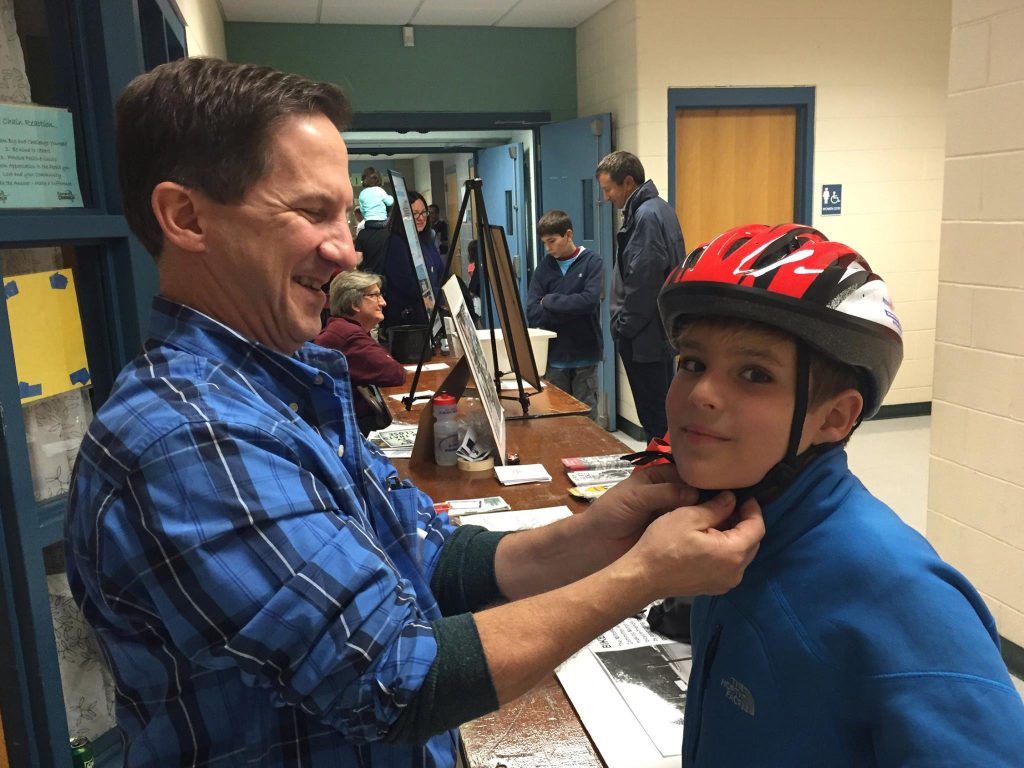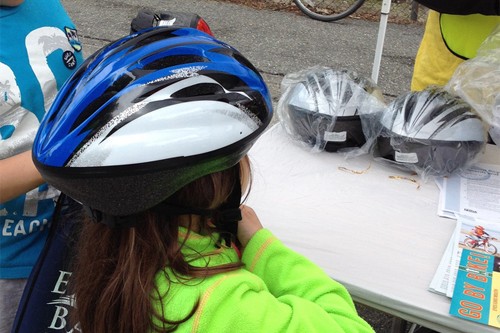Posts Tagged ‘“bicycle accident lawyers”’
New Bike Lanes Help, But Massachusetts Drivers Must Still Slow Down and Watch for Cyclists
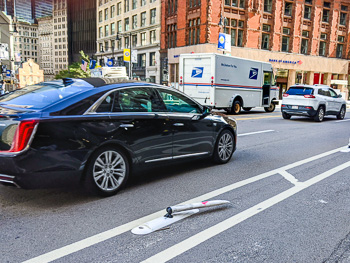
Flexipost down on bike lane at Center Plaza, across from Boston City Hall.
As COVID-19 kept many of us home, Boston and nearby cities built out an impressive 35 miles of new bike lanes in 2020 and 2021, according to a news report.
But, while encouraging safety, bike lanes alone cannot prevent cycling accidents. Drivers still have a responsibility to slow down, travel safely in their lane and use extra caution, especially as they get to know the new infrastructure.
Consider that bike lanes must be a minimum of 5 feet wide under state highway standards. In Boston, the city’s transportation department works to build at least 6 feet wide in areas with high bike traffic and 6 to 7 feet in areas with heavy parking turnover. Then factor in parking, traffic and bus lanes and you have more than covered the widest roads.
Finding New Bike Lanes in Boston, Cambridge and Nearby Cities
If you travel into Boston or Cambridge, you will find several miles of new bike lanes, including both conventional and protected bike lanes.
Conventional bike lanes – also called unprotected bike lanes – are flat lanes which create a designated lane for cyclists using paint and signage. Protected bike lanes are designed to add another layer of safety. These are usually more visible and use physical barriers – such as flexiposts or curbing – to separate cyclists from drivers.
During the pandemic, the City of Boston expanded its bike lane network with protected bike lanes on all roads around the Boston Public Garden. The city is now working to connect key stretches of bike lanes, including at the intersection of Beacon and Arlington streets near the west end of the Public Garden.
Beyond Boston and Cambridge, you can take a drive into Medford, Somerville, Newton or Brookline, among other communities, to see new bike lanes built during the pandemic. Somerville and Medford saw significant bike lane development along Route 28 and the Wellington Bridge, with funding from the state’s Shared Streets and Space Program.
Some of the new protected bike lanes are “quick-build” projects. Keep this in mind as you drive. Cities may now experiment and take flexiposts up and down as seasons and traffic volumes change.
How Boston Drivers Can Avoid Bike Lane Accidents
Now more than ever, it is critical to watch because there are more cyclists out. According to state figures, ridership is up more than 25 percent in many Massachusetts communities as we emerge from the pandemic.
Learn Where Cyclists Are Allowed to Ride
When driving, take a good look at the full road. You may initially notice the traffic lanes, intersections and stop signs. Many drivers, however, overlook the bike lanes, if the road even has them.
If you see bike lanes, consider these a guide. A cyclist may ride in the bike lane. But they may also have to move into the roadway at times to position themselves for a left turn or because the bike lane ends.
When the bike lane ends, a cyclist may choose to stay on the right side of the road or they may attempt to move into the traffic lane. Cyclists are allowed to ride up to two abreast in the traffic lane in Massachusetts. Many cyclists try to avoid this approach to avoid backing up traffic. But you will see this and it is important to give cyclists enough space to make safe decisions.
Drive Slowly
Maintaining a slow and safe speed near cyclists is critical. When you speed, you can easily cross over painted bike lanes or even flexiposts, and you leave yourself less time to respond if cyclists, pedestrians or other drivers make an unexpected move.
Open Car Doors Carefully
Drivers can injure cyclists and pedestrians even after they park. Drivers who open doors without checking, or leave a car door open as they get ready to get out, have caused many dooring accidents and serious injuries to cyclists in the Boston area.
At least 40 states – including Massachusetts – have recognized the danger of dooring and made this a traffic offense, according to the League of American Bicyclists.
The Danger of Parking in Bike Lanes
It is also illegal for drivers to park in bike lanes in Massachusetts under M.G.L. c. 89, § 4D. Drivers have to remember bike lanes are travel lanes for cyclists. If you park in a bike lane and a cyclist is injured as a result, you may be fined by local police, just as you can be if you open a door into a cyclist’s path.
The cyclist could also file a claim against you and hold you financially responsible for their medical expenses, lost wages and other damages.
Distracted Driving Can Be Deadly Near Cyclists
As you drive, look how close you are to cyclists and the bike lane. There is little room for error and it is highly dangerous to pick up your cell phone for any reason. You could veer off the road and into the bike lane, then hit a cyclist. Use your best judgment and wait. Another factor to consider is pedestrians. Both you and the cyclist approaching have a duty to stop and yield to pedestrians at crosswalks and other situations. There is no room for distractions.
The tragedy is at least two cyclists have been killed in distracted driving accidents in Massachusetts since the start of the pandemic.
In August 2020, a driver was reportedly texting and collided into three cyclists traveling along Topsfield Road in Ipswich, according to the Salem News. One of the cyclists later died at a local hospital and police charged the driver.
The criminal case was ultimately resolved last month, when the driver pleaded guilty to negligent motor vehicle homicide, but avoided jail time. The driver’s criminal defense lawyer argued she had texted with a friend earlier about visiting Crane Beach, but just before the crash, she suffered from a gastrointestinal condition and this caused her to take her eyes off the road, leading to the crash.
In Northampton, another driver is facing criminal charges in connection with a fatal bike crash in October 2021. Police allege the driver was using the FaceTime app and ran a stop sign near Northampton High School, then fatally injured the cyclist, according to local news reports. Now, a state legislator is seeking to update the state’s hands-free driving law to specifically ban video broadcasting and vlogging while driving.
Watch for Cyclists and Turn Safely at Intersections
When you stop at an intersection, you may expect cyclists to pull up to your right in the bike lane. They may do so. However, they may also come up behind you or move into the traffic lane to turn left.
Continue to look around your vehicle as you wait at the intersection and use caution when you make right-hand turns. Check your mirrors and blindspot so you can avoid turning right into cyclists and causing injuries. These are called “right-hook” bicycle accidents and they have often been fatal in Boston.
Under Massachusetts law, drivers can be cited for overtaking and passing bicyclists to make a right turn, unless they can turn at a “safe distance” at a “speed that is reasonable and proper,” M.G.L. c 90 § 14. With so much activity at intersections, it is better to just wait for cyclists to turn safely.
At Breakstone, White & Gluck, our attorneys have represented cyclists and families in wrongful death cases resulting from right hook bike crashes at intersections. These are painful experiences made worse because these accidents are preventable if drivers check their mirrors and blindspot for cyclists.
Operators of large trucks are responsible for many right-hook crashes. Truck companies can protect against injuries by providing drivers with proper training and upgrading equipment with sideguards and convex mirrors.
Free Legal Consultation – Boston Bicycle Accident Lawyers
Breakstone, White & Gluck is a strong supporter of safe cycling in Massachusetts and has been recognized by the League of American Bicyclists as a Silver Level Bicycle Friendly Business.
With more than 100 years combined experience, our lawyers fight for the rights of those injured by negligence or wrongdoing in personal injury cases. We have extensive experience representing cyclists who have been injured by negligent driving in the Boston area and across Massachusetts.
If you have been injured in a bicycle accident, learn your legal rights. Call for a free legal consultation and our attorneys will review the facts of your case with you to help you determine if you have a potential claim against a driver to help you with your recovery. Do not hesitate to call; we are experienced at working with both cyclists and family members to address all your concerns and preserve your legal rights in the hours, days and months after a bike crash.
For a free legal consultation, call 800-379-1244 (toll-free) or 617-723-7676 or use our contact form.
Encouraging Boston Drivers to Look For Cyclists
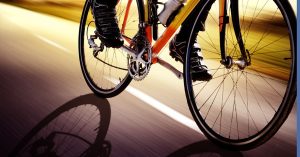
Safety reminders for drivers as cyclists return to the road in Boston.
In Boston, many cyclists take a winter break. As this nears an end, drivers should get ready to commute alongside cyclists again. Everyone should be aware of the risks for bicycle accidents at intersections. These include right hook accidents, which occur when a driver fails to yield to a cyclist while turning right.
Drivers must remember that cyclists have the same rights and responsibilities as drivers. Here, we share a few safety tips for drivers from the National Highway Traffic Safety Administration (NHTSA):
- Obey the speed limit.
- Drive defensively. Cyclists may need to leave their lane for safety reasons and may not give you much notice.
- Yield to cyclists just as you would another motor vehicle.
- When turning right on a red light, check for cyclists to the right and behind you. Stop completely and look in both directions – left, right, left and behind.
- Provide cyclists with adequate space.
- Pass cyclists with care. Do not pass too closely and only do so if you would pass a motor vehicle in the same situation.
- Check before you pull out or back up in parking lots.
- Check for cyclists when at stop signs. Expect that a cyclist may come up behind you while you wait for your turn to go.
Driving Safely Near Bicyclists in Massachusetts
Gone are the days when drivers rarely saw a cyclist on the road. It’s critical for drivers to be informed about their responsibilities near cyclists, particularly in intersections, and the potential for bicycle crashes.
As a driver, if you are near a bicyclist, the best approach is to slow down and give them room. Do not take your eyes off the cyclist or the road. If you don’t see a cyclist, take the opportunity to look.
Leave the bicycle lane for cyclists – this is the law in Massachusetts and if you neglect to follow it, you could hit a cyclist, causing serious injury and confusing other drivers. And this could lead to domino-effect collisions with other vehicles, cyclists or pedestrians in the area.
Expect cyclists will be traveling in front of you, as well as behind you. In fact, they are more likely to be behind you, to the right (though they are allowed to travel in the center of the lane in Massachusetts if they need to). Checking your mirrors is essential, as is left-right-left and behind checking. This is true even after you park because cyclists could be riding by and by opening the door at the wrong time, you could cause a bicycle dooring injury.
Finally, remember cyclists may not be visible behind commercial trucks and other traffic. The cyclist may be out of your view, but just approaching the large vehicle behind you. If the vehicle behind you is obstructing your view, take an extra few seconds.
For more information, read our articles, “Facts About Bicycling Laws in Massachusetts,” or “Tips for Safe Bike Commuting in Boston.” You can also visit the MassBike website, which explains more about cyclist and motorist responsibilities or the NHTSA web page on bicycle safety.
Free Legal Consultation – Boston Bicycle Accident Attorneys
Breakstone, White & Gluck has extensive experience handling personal injury cases involving bicycle injuries in Boston and across Massachusetts. After a bicycle accident, our attorneys are here to provide clients with thorough investigation and aggressive representation. We understand the stakes are high when you have been injured on a bicycle because medical bills can mount quickly and no one expects to suffer an injury. But we have attorneys who are experienced as lawyers and as cyclists. We are committed to partnering with our clients to obtain the best financial result in every case.
For a free legal consultation, contact Breakstone, White & Gluck at 800-379-1244 or 617-723-7676. You can also use our contact form.
Massachusetts Lawyers Weekly Mentions Breakstone, White & Gluck’s Project KidSafe Campaign
Massachusetts Lawyers Weekly recently gave Breakstone, White & Gluck and our Project KidSafe campaign a nice mention. In 2019, our campaign donated over 4,000 bicycle helmets to children throughout the Boston area with help from more than 30 community partners and police departments. We look forward to continuing our work to protect children in 2020.
Read the article on the Massachusetts Lawyers Weekly website (subscription access required).
Breakstone, White & Gluck Donates Bike Helmets to the City of Boston and Boston Bikes for 6th Year
As part of our Project KidSafe campaign, Breakstone, White & Gluck has worked to promote safe cycling across the state of Massachusetts. We have been especially active in the city of Boston, donating our Project KidSafe bicycle helmets to a number of organizations. One of these organizations is Boston Bikes, which is part of the City of Boston’s Transportation Department. Over the past six years, our attorneys have given roughly 1,200 helmets to Boston Bikes’ programs, including women’s cycling classes, Roll It Forward and youth cycling in city schools. Roll It Forward is a retired program, but it used to fix up used bikes for city residents who needed one. Meanwhile, the youth cycling programs teach safety as soon as children start riding.
Thanks to Boston Bikes for sending these photos from the youth cycling programs. Looks like another great year!
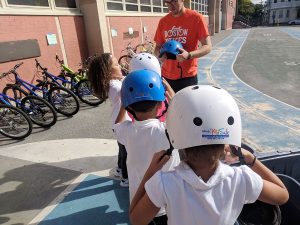
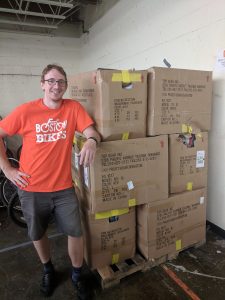
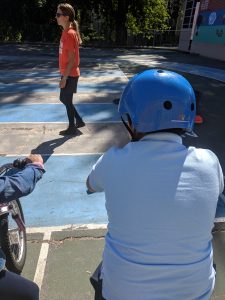
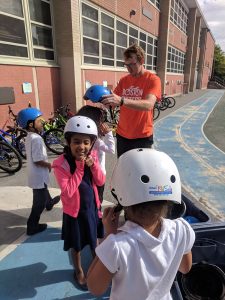
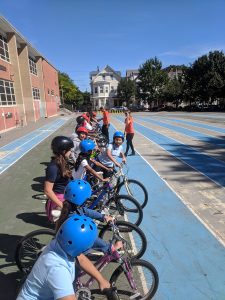
About Breakstone, White & Gluck and Our Project KidSafe Campaign
Breakstone, White & Gluck is a Boston personal injury law firm. Our attorneys launched our Project KidSafe campaign in 2013 and have since donated over 20,000 bicycle helmets across Massachusetts. We launched our Project KidSafe campaign because we represent cyclists who have been catastrophically injured. We know that helmets can reduce the risk of suffering severe head injuries and traumatic brain injuries if a cyclist crashes or falls. By encouraging children to wear helmets early, we hope to prevent these injuries.
Read more about our Boston personal injury lawyers on our website.
Photos from Boston’s Bike to Work Festival 2018
Breakstone, White & Gluck was pleased to participate in Boston’s Bike to Work Festival on May 18, 2018. The City of Boston organizes this event each year to encourage and celebrate cycling. Cyclists can ride right into City Hall Plaza and enjoy a free breakfast and vendor tables. Our attorneys have participated in this event for the past few years and it’s always a fun way to close out Bay State Bike Week and Bike Month. This year, we set up our Project KidSafe tent and fit 70 free bicycle helmets for cyclists who needed one.
If you missed this year’s event, you can learn more on the City of Boston’s website. Read more about our Project KidSafe campaign on our website.
Here are a few photos from the event:
- Attorney David W. White, Becca Wolfson, Executive Director of the Boston Cyclists Union and Attorney Marc L. Breakstone.
- Blue Bikes. By year’s end, the public bike sharing system is gearing up to be 3,000 bikes strong.
- From 2019 Bay State Bike Week: Attorney David W. White with Galen Mook, executive director of MassBike and Lee Toma, of Milton Bike.
- The line for our Project KidSafe bike helmets!
- Many cyclists rode in on group convoys.
- Attorney David W. White and Attorney Marc L. Breakstone
- Attorney Marc L. Breakstone with a cyclist at our Project KidSafe tent.
BWG Project KidSafe 2016: 10,000+ Bicycle Helmets Donated to Children
Breakstone, White & Gluck has completed its 2016 Project KidSafe campaign, donating nearly 5,000 helmets to children in Massachusetts this year. With help from local bicycle committees, police departments, schools and community groups, we have now donated more than 10,000 bicycle helmets over four years to help children ride safely.
Our partners, Marc L. Breakstone, David W. White and Ronald E. Gluck, thank everyone who has helped us and embraced our goal: to keep children and families safe and encourage them to wear a helmet every time they ride to prevent serious head injuries.
- Attorney Ron Gluck and Attorney David White join the Cambridge Police and students at the Cambridgeport School. Breakstone, White & Gluck donated 140 bicycle helmets for the Cambridge Police to distribute through its first-ever helmet voucher program.
- Attorney David W. White at a safety event in Easthampton last May. Breakstone, White & Gluck donated 140 helmets for the event.
- Attorney Marc L. Breakstone and the fifth-graders at the Dr. Albert F. Argenziano School in Somerville. Breakstone, White & Gluck donated 300 helmets to students who finished the CYCLE Kids curriculum.
- Milton Bike fits helmets donated by Breakstone, White & Gluck’s Project KidSafe campaign for children at Celebrate Milton in October.
- Attorney Reza Breakstone fits a helmet at the Dedham Bike Rodeo. Breakstone, White & Gluck donated 120 bike helmets to children at the Dedham Bike Rodeo. This was our fourth year participating.
- Attorney David W. White at the Joseph M. Tierney Learning Center in South Boston
- Tewksbury Police distributed helmets from our Project KidSafe campaign.
- Attorney David W. White with a young cyclist at the Joseph M. Tierney Learning Center in South Boston last summer.
- In August, Attorney David White with Everett Police Captain Richard Basteri.
- Breakstone, White & Gluck donated 100 bicycle helmets to children served by the Windsor Street Care Center in Cambridge.
- Attorney Reza Breakstone and Framingham Police fit children for helmets at the Framingham Earth Day Festival.
- Children in Easthampton listen to Attorney David W. White speak about bicycle safety.
- Photo: Attorney David White stopped at The Home for Little Wanderers this week and delivered bicycle helmets from Breakstone, White & Gluck’s Project KidSafe campaign. He was greeted by (left) Paige Oldaker, Leadership Gifts Officer; Johanna Lauer, Volunteer Mentor; and Taryn Marino, Manager of Volunteer and Mentor Programs. (next to David).
- Attorney Marc L. Breakstone with a cyclist and an instructor at the iCan Shine Bike Camp in Arlington last April.
- Graduates of the Girls in Action Program with Attorney David W. White. Breakstone, White & Gluck donated helmets for the program, which is led by Bikes Not Bombs.
- Attorney Ronald E. Gluck and Attorney David W. White with members of the Malden Police Department, which received 100 helmets from our Project KidSafe campaign.
Our Partners:
Boston Bikes, Roll It Forward
CYCLE Kids
Bikes Not Bombs
Arlington iCan Shine Camp
Arlington Bicycle Advisory Committee
Ashland Farmers Market
Bicyclecentro of East Boston
Bike Milton
Commonwheels Bicycle Collective
Dedham Bike Rodeo
East Arlington Livable Streets Coalition
Easthampton Healthy Youth Coalition
Framingham Bicycle and Pedestrian Advisory Committee
Friends of Lexington Bikeways
Groundwork Somerville
Haynes Early Education Center in Roxbury
Massachusetts Safe Routes to School
Northbridge Public Schools
Somerville Kiwanis Club
Somerville Public Schools
The Home for Little Wanderers
Tierney Learning Center of South Boston
Up Academy Dorchester
Watertown Bicycle and Pedestrian Committee
Westborough Bicycle and Pedestrian Advisory Committee
Westwood Pedestrian and Bicycle Safety Committee
Windsor Street Care Center of Cambridge
Worcester Earn-a-Bike
Our Police Department Partners:
Cambridge Police
Dedham Police
Everett Police
Randolph Police
Norwood Police
Waltham Police
Marlborough Police
Malden Police
Tewksbury Police
Somerville Police
Framingham Police
Lexington Police
Cycling Clubs and Bicycle Organizations:
We were also pleased to support safe riding in other ways, by sponsoring the Boston Cyclists Union, MassBike, Northeast Bicycle Club, Charles River Wheelmen, New England Mountain Bike Association (NEMBA), CYCLE Kids and Bikes Not Bombs. We are also sponsoring the Boston Bikes #BeBrilliant campaign again in 2016.
Breakstone, White & Gluck Donates Children’s Bicycle Helmets in Milton and Westwood
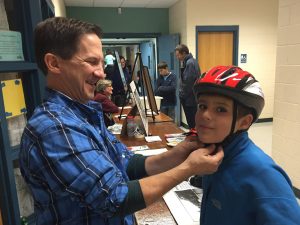 Breakstone, White & Gluck cares about bicycle safety in Boston and across Massachusetts. Over the past four years, our attorneys have donated brand-new bicycle helmets to children who need one through our Project KidSafe campaign.
Breakstone, White & Gluck cares about bicycle safety in Boston and across Massachusetts. Over the past four years, our attorneys have donated brand-new bicycle helmets to children who need one through our Project KidSafe campaign.
Wearing a helmet is the most effective step a cyclist can take to prevent a brain injury in a car accident or fall on a bicycle. While important for all cyclists, wearing a helmet is especially important for children, who are still growing and in development.
Breakstone, White & Gluck is nearing the end of the fourth year of our Project KidSafe campaign. Since 2013, our campaign has donated over 10,000 new bicycle helmets to children who needed one. Along the way, over 40 community groups, bicycles safety organizations, police departments and schools have pitched in to help us protect children. Many of these groups help us year in and year out.
We had our busiest year yet in 2016, donating over 4,000 children’s bicycle helmets. Here are a few of our recent donations. We thank our partners Bike Milton and the Westwood Pedestrian & Bicycle Safety Committee.
Bike Milton
Breakstone, White & Gluck recently donated 100 children’s bicycle helmets to Bike Milton, the town of Milton’s bicycle committee (photo above).
On Oct. 2, the Bike Milton distributed bicycle helmets to children at Celebrate Milton, and showed children and parents how to properly fit the helmets. Bike Milton also gave away free bike maps and shared information about the town’s new bike lanes. The Neponset River Greenway extension is also opening soon, which will allow cyclists to ride safely on a protected path. The path runs through Milton, Dorchester and other communities near Boston.
Bike Milton is an active partner of the Safe Routes to School program, which works in schools across the state to teach children how to ride bikes and walk to school safely (Breakstone, White & Gluck is also a supporter of Safe Routes).
Bike Milton is an advocate for safety and has campaigned to make the intersection of Neponset Valley Parkway, Brush Hill Road and Milton Street safer for drivers, cyclists and pedestrians. The intersection had no crosswalks and saw 34 reported accidents over an 8-month period. Visit their website to learn more.
Westwood Pedestrian & Bicycle Committee
For the third year, Breakstone, White & Gluck donated bicycle helmets to keep the children of Westwood safe. Our thanks to the Westwood Pedestrian and Bicycle Committee, which distributed helmets to children at Westwood Town Day on September 24th. Committee members also spoke to families about the importance of wearing a helmet on every bicycle ride.
Attorney David White of Breakstone, White & Gluck is a member of the Westwood Pedestrian and Bicycle Safety Committee, but was unable to attend this year. The committee said all still went smoothly and they distributed over 100 helmets in three hours.
Tips for Fitting a Bicycle Helmet
Questions about bicycle helmets? Visit our bicycle safety page.
About Breakstone, White & Gluck
Breakstone, White & Gluck, a Boston personal injury law firm, is committed to the safety of all bicyclists in Massachusetts. We have over 100 years combined experience representing bicyclists injured by the negligence of others. If you, or a member of your family, has been injured in a bicycle incident, please feel free to contact us for a free legal consultation at 800-379-1244 or 617-723-7676 or use our contact form. Thank you and RIDE SAFE!
Safety for Pedestrians, Cyclists and Drivers
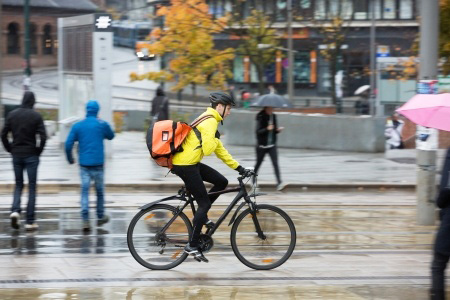 Safety for pedestrians and drivers was in the spotlight this winter, as Boston endured a record snow fall and everyone stood divided by the tallest of snowbanks. Now, as the snow starts to melt, cyclists are back out too and we want to take a moment to share a few safety reminders.
Safety for pedestrians and drivers was in the spotlight this winter, as Boston endured a record snow fall and everyone stood divided by the tallest of snowbanks. Now, as the snow starts to melt, cyclists are back out too and we want to take a moment to share a few safety reminders.
Safety was a priority this winter because Massachusetts saw many car accidents, even though state officials called multiple snow emergencies, and many schools closed, to keep the roads clear. We also saw at least two fatal pedestrian accidents. In Weymouth, a woman was hit and killed by a snow plow as she walked in the parking lot of her condominium complex. A 60-year-old employee at a Medford Whole Foods store also was killed, hit by a snow plow in the parking lot, leaving after his work shift.
Safety advocates made progress on protecting cyclists and pedestrians in 2014. This will serve as a strong foundation as we dig out from this harsh winter. In Boston, the city has implemented a truck safety ordinance, requiring that city-contracted trucks use sideguards and other protections aimed at protecting pedestrians and cyclists.
MassBike and other safety advocacy groups have also proposed new legislation which may get attention after this hard winter. If passed, the Bike Lane Protection Bill would make it illegal to block established bike lanes. The Vulnerable Road Users Bill would define pedestrians, cyclists, emergency personal and others as vulnerable road users and define a safe-passing distance for them.
Here are a few safety tips and facts to remember for pedestrians, cyclists and drivers:
Pedestrians
- Pedestrian accidents are too common. On average, in 2013, a pedestrian was killed every two hours and injured every eight minutes in traffic crashes, according to the National Highway Traffic Safety Administration (NHTSA).
- Walk on the sidewalks whenever possible. If a street only has sidewalks on one side, cross over.
- If you have to walk on the street, walk so you are facing oncoming motor vehicle traffic. Walk as close as you can to the curb to increase the space between you and traffic.
- Use crosswalks whenever they are available.
- Limit use of cell phones, iPods and music players.
- A common misperception is most pedestrian accidents happen at intersections. That is not true. Some 69 percent of pedestrian accidents occurred at non-intersections in 2013, according to the NHTSA.
- Some 10 percent of pedestrian accidents happened off the road, in areas such as parking lanes/zones, bicycle lanes, shoulders/roadsides, driveway access and similar areas.
- In the Spring of 2013, most pedestrian fatalities, 25 percent, occurred between 9 to 11:59 p.m., according to the NHTSA. Another 22 percent occurred between 6 to 8:59 p.m.
- If you walk at night, purchase a neon glow vest so you stand out to traffic. Even if you never wear it, it pays to be prepared.
Bicyclists
- Wear a bike helmet which meets the safety standard of the Consumer Product Safety Commission and properly fits.
- Cyclists follow different rules than pedestrians. Go with the flow of traffic, traveling in the same direction as cars, on the right side of the road. Up to two cyclists can ride in the middle of the traffic lane abreast if necessary to stay safe, but you should move back onto the side of the road single file when you can safely do so.
- State law prohibits biking on sidewalks in business districts. Not every city and town has a designated business district. But assume you are not allowed to ride on the sidewalk or ask the local police department for guidance.
- Cyclists must use hand signals to communicate to drivers, unless it would be unsafe to do so. You can view this video to learn the proper hand signals. Cyclists should also use a bell to let pedestrians know they are approaching.
- Watch out for dooring. This is when a car parks and the driver opens their door and hits you as you pass through. It is against the law, but it happens often.
- You are required to use a white headlight and red taillight or rear reflector if you ride anytime from a half hour after sunset until a half hour before sunrise.
- If you ride at night, consider purchasing a neon safety vest or clothing so you are more visible drivers..
- If you are involved in a bicycle accident, file a police report, even if you do not think you are seriously injured at first.
- Many drivers may not stop after cycling accidents. If you are hit and the driver does not stop, immediately contact police and file a police report.
Motor Vehicle Drivers
- Look for cyclists and pedestrians at every intersection and yield to them.
- Drivers must pass bicyclists at a safe distance. If you cannot, you must wait until it is safe to do so or change lanes.
- Obey all traffic laws and signals. Look for areas designated as school zones. Reduce your speed and take extra care on these roads.
- Do not park in bike lanes.
- Do not use your cell phone in the car. It is against the law in Massachusetts for drivers to text and drive, but the best practice is not to use it for telephone calls or other reasons either. It only takes a few seconds to cause a distracted driving car accident.
- A very dangerous practice is dooring. This is when a driver parks their car and opens the door without looking and hits an oncoming cyclist. It is against the law and violators can be fined. But drivers may also face a steeper penalty, a personal injury lawsuit, because cyclists can be seriously injured and the injuries can require months of recovery and hospital bills.
More Cycling Safety Resources
These are just a few rules of the road. To learn more, visit:
Shifting Gears: Bicyclists and Public Safety. Produced by MassBike, the Massachusetts Department of Public Health and the Boston Police Department.
Bike Safety in Massachusetts, Breakstone, White & Gluck.
What Every Massachusetts Bicyclist Needs to Know About Car Insurance, Breakstone, White & Gluck.
Boston Mayor Proposes New Truck Safety Ordinance
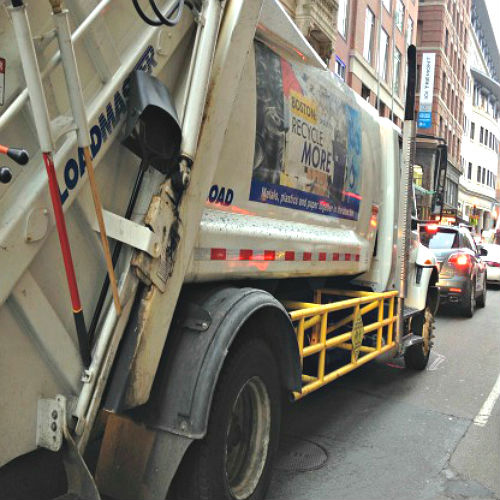
Mayor Marty Walsh is proposing a new safety ordinance for city-contracted trucks in Boston, a measure being widely watched after several cyclists have died in truck crashes. It is believed to be the first such ordinance in the nation.
Walsh, who took office in January, submitted an Ordinance to Protect Vulnerable Road Users to the Boston City Council earlier this week. The City Council was expected to take it up today in session.
If passed, the ordinance will require side guards, convex mirrors, cross-over mirrors, and blind-spot awareness decals on all vehicles over 10,000 pounds which are contracted with the city. The goal is to prevent truck accidents by giving drivers a better view around them. When trucks do not comply, fines start at $100 for the first offense and contracts can ultimately be terminated.
The Boston Cyclists Union called for these measures after a cyclist was killed in a Charlestown truck accident in April. It has released a fact sheet, “Safeguards Saves Lives.” According to the fact sheet, 4 percent of vehicles in the U.S. are trucks though they cause 11 percent of all bicyclist fatalities and 7 percent of all pedestrian fatalities.
Since 2010, 11 cyclists in Boston have died as a result of motor vehicle crashes, according to figures cited by Boston Magazine. Seven cases involved trucks. Here is another concerning figure: From 2009 to 2012, there were 1,700 confirmed cyclist incidents documented by Boston EMS emergency medical technicians and paramedics.
The City of Boston has been working on truck safety. Last year, the city began a pilot program, the largest in the nation. The Mayor’s Office of New Urban Mechanics and the city’s Public Works Department tested three different types of guards on 16 active vehicles driving the streets.
In April, the National Traffic Safety Board made similar recommendations to prevent tractor-trailer accidents.
About Breakstone, White & Gluck
The Boston personal injury lawyers at Breakstone, White & Gluck have over 100 years combined experience representing injured cyclists and pedestrians. We support efforts to make the roads of Boston safer and donate bike helmets for children each year, in Boston as well as Cambridge and Somerville and other communities. For a free legal consultation, visit 800-379-1244 or 617-723-7676 or use our contact form.
Bike Helmet Donations in Worcester and Lexington
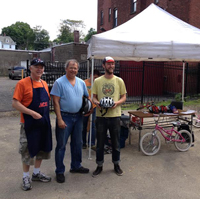 This spring, Breakstone, White & Gluck donated bike helmets to children in several Massachusetts communities, including Boston, Arlington, Framingham, Westborough, Worcester and Lexington. We write about two events here.
This spring, Breakstone, White & Gluck donated bike helmets to children in several Massachusetts communities, including Boston, Arlington, Framingham, Westborough, Worcester and Lexington. We write about two events here.
Worcester Earn-a-Bike. On May 31, attorney David White pitched in at the Worcester Earn-a-Bike’s 4th Annual Kids Bike Sale. Worcester Earn-a-Bike is a community program which teaches fun and affordable bike repair to neighborhood youth and community members. It operates a bike shop which repaired many of the bikes on sale.
At the sale, families got to purchase refurbished bikes for children for just $5! We donated helmets to children who needed one at the sale. Visit the Worcester Earn-a-Bike website to learn more about their work.
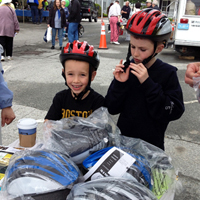 Friends of Lexington Bikeways. On May 24, we donated bike helmets to children through the Friends of Lexington Bikeways and Discovery Day in Lexington.
Friends of Lexington Bikeways. On May 24, we donated bike helmets to children through the Friends of Lexington Bikeways and Discovery Day in Lexington.
If you live in Lexington, you are probably familiar with the Friends, who work to preserve and maintain the Minuteman Commuter Bikeway and other shared use paths. They work closely with the Lexington Bicycle Advisory Committee and each winter, they clear the bikeway of snow for cyclists, cross country skiers and others.
By the way, congratulations to the Friends, the Lexington Bicycle Advisory Committee and the Town of Lexington!
In May, the League of American Bicyclists recognized Lexington as a Bronze Level Bicycle Friendly Community. The League has recognized 303 bicycle friendly communities in the U.S. Massachusetts now has seven communities on the list, including Lexington, Boston, Cambridge, Somerville, Newton, Arlington and Northampton.
Lexington’s application was coordinated by Bicycle Advisory Committee chair Peggy Enders, who also coordinated our donation to the Friends of Lexington Bikeways. Read what she told the Lexington Patch about town’s new recognition.
Visit the Friends of Lexington Bikeways’ website to learn more about their work.
